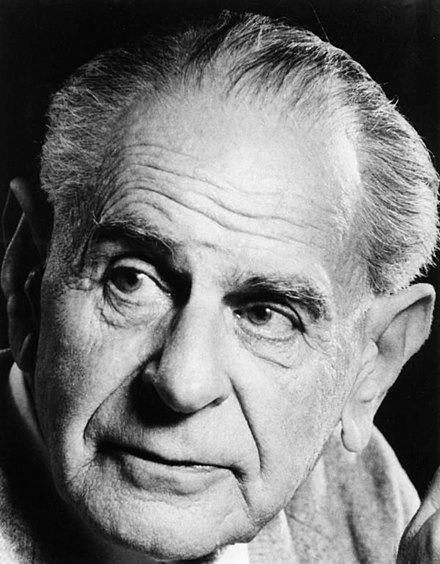
Föreställningen att presidenter faktiskt har makt att styra är en form av konspirationsteori, enligt vetenskapsteoretikern Karl Popper. Intressant är att Popper inte främst kritiserar dem vi idag kallar för konspirationsteoretiker utan snarare de forskare, aktivister och journalister som är övertygade om att de inte är konspirationsteoretiker. Han kritiserar dem som förutsätter att det som sker i våra samhällen är planerat och avsiktligt.
Samhällen är komplexa och enligt Karl Popper är det samhällsvetenskapernas uppgift att förklara hur händelser och saker sker oplanerat. Visst kan regeringar ha avsikter. Och deras beslut får givetvis konsekvenser. Men förutom i begränsade sammanhang är konsekvenserna sällan avsiktliga. Det var inte så det var tänkt!
Styrande som vidskepelse
Innehåll
Att Hitler, Stalin, Nixon, Trump, Putin faktiskt skulle styra sin nation och till och med världshändelser är en form av vidskepelse som kommer från myterna om de grekiska gudarna, enligt Popper. Myterna förklarar det som sker med att gudar konspirerar och styr.
I dagens sekulariserade samhällen översätts gudamyterna till föreställningar om att ledare styr det som sker. Enligt Popper är tron på makthavare en form av teism, tro på att högre makter styr.
Märkligt nog blir de moderna föreställningarna om styrande mer vidskepliga. I äldre myter är det tydligt att berättelserna är myter. Motsägelsefulla berättelser berättades om vartannat. De var viktiga för att lyfta fram olika poänger. Moderna myter riskerar att få en mer fundamentalistisk funktion. De uppfattas bokstavligen som sanna.
Kritik mot att ledare kan ha eller förvara makt beskriver jag som makthavareateism i andra texter. Jag har även maktkritiskt analyserat ledarskap utifrån olika aspekter.
Vidskepelse som lanseras som självklara fakta blir svårt att bryta sig ur. Journalister, aktivister och forskare som pekar ut individer som styrande kamouflerar maktordningar. Vår lydnad och vårt motstånd i myller av maktordningar suddas ut. Att ledare styr låter så självklart. Denna självklarhet kamouflerar hur lydnad, samarbete och motstånd hamnar i resonans och dissonans.
Strukturer, system, organisationer, grupper och olika maktordningar reduceras till spelplan för de stora ledarna. Utpekandet av Mao, Trump eller Putin som faktiskt styrande tillsätter dem som de egentliga subjekten, till de riktiga aktörerna. Vi andra avsätts.
Per Herngren
11 december 2022, version 0.1.1
Karl Poppers The Conspiracy Theory of Society
Citaten nedan är utdrag från Karl Poppers ”The Conspiracy Theory of Society” från 1962.
Makthavare som vidskepelse
”I should like to begin by describing a theory which is held by very many rationalists— a theory which I think implies exactly the opposite of the true aim of the social sciences. I shall call this theory the ‘conspiracy theory of society’. This theory, which is more primitive than most forms of theism, is akin to Homer’s theory of society. Homer conceived the power of the gods in such a way that whatever happened on the plain before Troy was only a reflection of the various conspiracies on Olympus. The conspiracy theory of society is just a version of this theism, of a belief in gods whose whims and wills rule everything. It comes from abandoning God and then asking: ‘Who is in his place?’ His place is then filled by various powerful men and groups — sinister pressure groups, who are to be blamed for having planned the great depression and all the evils from which we suffer. The conspiracy theory of society is very widespread, and has very little truth in it.”
Tron på att händelser är avsiktliga
”I think that the people who approach the social sciences with a ready made conspiracy theory thereby deny themselves the possibility of ever understanding what the task of the social sciences is, for they assume that we can explain practically everything in society by asking who wanted it, whereas the real task of the social sciences is to explain those things which nobody wants — such as, for example, a war, or a depression.”
Konspirationsföreställningar om grupper
”It is the task of social theory to explain how the unintended consequences of our intentions and actions arise, and what kind of consequences arise if people do this that or the other in a certain social situation. And it is, especially, the task of the social sciences to analyse in this way the existence and the functioning of institutions (such as police forces or insurance companies or schools or governments) and of social collectives (such as states of nations or classes or other social groups). The conspiracy theorist will believe that institutions can be understood completely as the result of conscious design; and as collectives, he usually ascribes to them a kind of group-personality, treating them as conspiring agents, just as if they were individual men.”
Konspiratörer misslyckas med att styra
”But the interesting thing is that such a conspiracy never— or ‘hardly ever’— turns out in the way that is intended. (…) Hitler, I said, made a conspiracy that failed. Why did it fail? Not just because other people conspired against Hitler. It failed, simply, because it is one of the striking things about social life that nothing ever comes off exactly as intended. Things always turn out a little bit differently. We hardly eve produce in social life precisely the effect that we wish to produce, and we usually get things that we do not want into the bargain.”
Karl Popper, The Conspiracy Theory of Society, först publicerad 1962.
Referens
Karl Popper, ”The Conspiracy Theory of Society”, i David Coady (red), Conspiracy Theories The Philosophical Debate, New York: Routledge, 2018.
Per Herngren, Texter om makthavareateism.